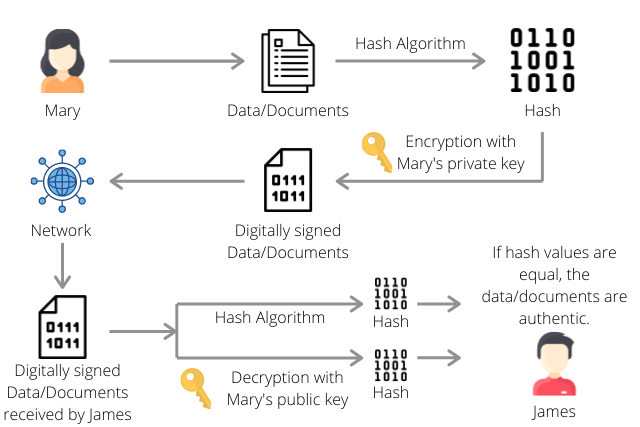What is a digital signature?
A digital signature is a specific kind of electronic signature (or e-signature) to digitally sign and secure electronically transmitted documents. It is widely recognised as the most secure type of electronic signature, among the many different types out there. All digital signatures operate in a standard and an internationally accepted format, called the public key infrastructure (PKI) protocol. Therefore, it is regarded as the most secure type of electronic signature, and it is legally binding in many countries.
Digital signatures are identical to physical signatures in that they are unique to every person. They support “non-repudiation”, time-sensitive transactions, audit trails and regulation requirements. They identify the identity of the signer, provide a timestamp of when the documents are signed and support an audit trail if needed. They also provide a tamper-evident seal to secure and proof the authenticity of a document, ensuring it has not been altered since the time of signing. This is extremely important for working with documents online securely.
How does a digital signature work?
As mentioned above, digital signature works by using a specific protocol, PKI. It is regarded as the golden standard when it comes to validating and authenticating digital identity through encryption. Under the PKI protocol, a mathematical algorithm that can only be done by a computer generates two long numbers (known as keys), which act as a pair of related keys, a public key and a private key. Both the keys act together to encrypt and decrypt a message, through an encryption mechanism known as the public key cryptography. They work together to generate a digital signature for the document signer, which is equivalent to his/her digital identity.
Here is an example of the whole working process of a digital signature:
- Mary selects a file to digitally sign it to send it to her colleague, James.
- A hash value of the file’s contents is generated by Mary’s computer.
- This hash value is encrypted with Mary’s private key to create a digital signature.
- The file with the digital signature is sent to James.
- James receives the message, and his computer program identifies the file has a digital signature. When he opens the file, his computer will proceed to decrypt the digital signature using Mary’s public key, then calculate the hash of the original message and compare the hash it receives to the decrypted hash received with Mary’s message.
- Any difference in the hash values means there has been a tampering of the file.

The whole working process of a digital signature
What are the benefits of using a digital signature?
A digital signature brings many benefits in the process of document handling, and it works better than traditional signatures. Here are some of the benefits of using a digital signature to sign electronic documents.
- Highly trusted and compliant to proven consent of the signer.
When the signer digital signs an electronic document, he/she needs to supply specific credentials to perform the action. The credentials are unique for each individual. By digital signing a document, it is a strong indication equivalent to the signer giving consent for his/her signature, and it also confirms his/her identity, because no one else has his/her specific credentials. Hence, a digital signature is highly trusted and compliant with laws, which also acts as a written evidence to confirm one’s identity.
2. High security and protection
A digital signature provides an audit trail that is retraceable to validate changes to an electronic document. It is cryptographically bound to the said document and the audit trail acts as a tamper-seal to ensure no alterations are made after a document is digitally signed. An approach like this ensures that when the receiver opens the document, the contents in it are exactly the same as intended by the sender. Any detected differences will alert the receiver about the authenticity of the document, providing protection to the document and the recipients.
3. Convenience in terms of time-saving and cost effectiveness
Digital signature is done fully online without the need to have physical copies of documents. It saves time in managing documents and obtaining physical signatures from multiple parties, especially when there is a large number of documents. Instead of preparing them physically through printing, in-person appointments, scanning, dispatching and running around, send a digital copy to all and save time! It is also cost-effective, which reduces paperwork cost, travelling cost, or even costly mistakes due to human errors while handling them physically.

Use cases for digital signature
Nowadays, many businesses and their online documents make use of digital signatures to increase the efficiency for their business processes, while at the same time ensuring the security of these documents which are used in critical business transactions. Example documents include:
- Contracts and legal documents: Many countries recognise digital signatures as legally binding, hence they are suitable for such documents, which require authenticated signatures and unmodified assurance.
- Sales agreements: Digital signature on these documents protect both buyers and sellers and it provides peace of mind for both parties. Their identities are authenticated, their signatures are legally binding and they know the terms and condition of the agreements are not altered by any third parties.
- Banking and financial documents: The financial department of companies can digital sign their invoices and send to their customers. Customers are protected, knowing the payment requests are from authenticated and the true seller, not a bad actor scamming them to send money to a fraudulent account.
- Healthcare data: Data privacy is of utmost importance in the healthcare industry, especially patient records and research data. Digital signatures protect the sensitive information contained in these data and make sure they are not altered during sharing between qualified parties.
- Government documents: When government agencies handle data, they need to adhere to strict guidelines and regulations. Digital signatures streamline the process by making certain the right people with the right authority can perform government approvals, without being altered illegally.
- Shipping documents: Digital signatures help manufacturers reduce costly shipping errors, due to incorrect cargo documents or tampering. Digitally signing shipping documents are much more accessible and safer compared to physical shipping documents.
Start selling digital signing certificates with WebNIC
A digital signature can only be created with digital signing certificates. Therefore, WebNIC has added a new service to provide document signing certificates service to our valued partners. Our digital signing brands include world-renowned brands, DigiCert, Sectigo and GlobalSign to help our partners deliver the best digital signature service. Digital signature is gradually becoming more mainstream and it will evolve into an important must-have when it comes to dealing with documents online! Get started selling today and be a part of this global trend towards a digital signing age!
About WebNIC
WebNIC is an accredited registrar for ICANN, and various countries including Asia, Europe, America, Australasia, and Africa. With offices in Singapore, Kuala Lumpur, Beijing, Taipei and Jakarta, we serve 5,000+ active resellers over 70 countries. To join us and become a reseller, live chat with us or email us at inquiry@webnic.cc.

